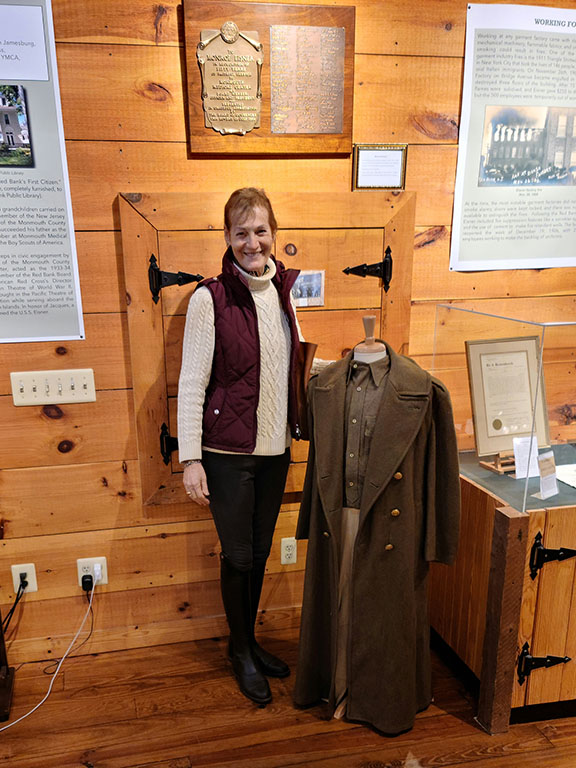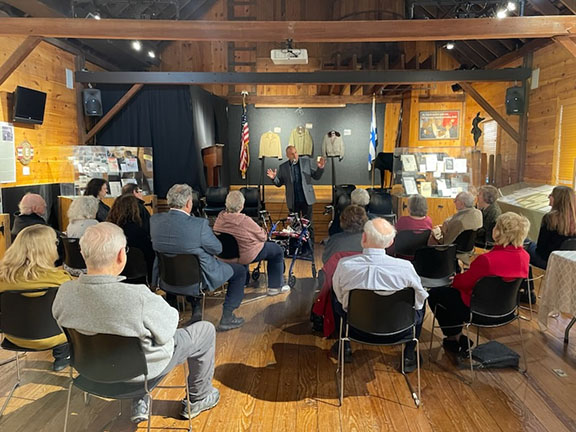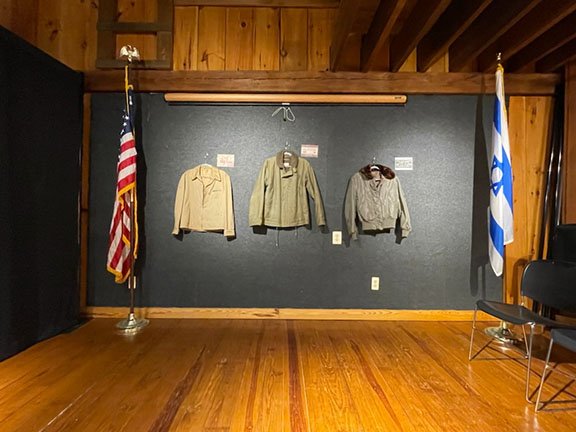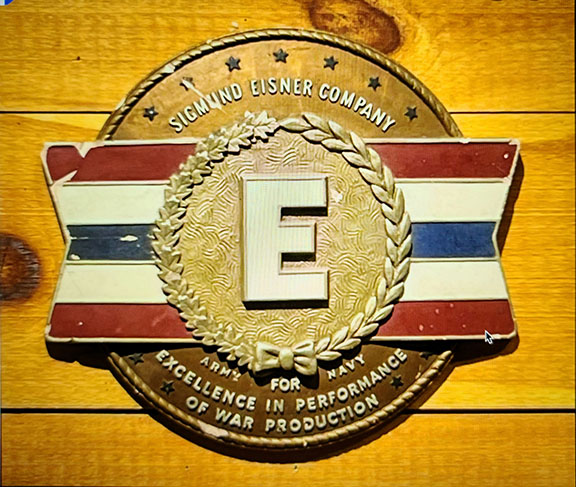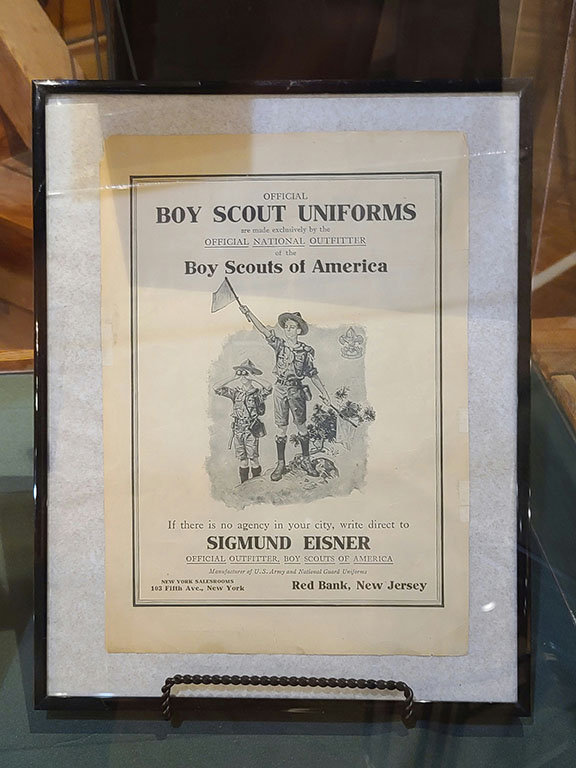By Eileen Moon
FREEHOLD – The building that is now home to the Galleria retail and restaurant complex holds a significant place in the history of Red Bank.
In the early years of the 20th century, Sigmund Eisner established the Sigmund Eisner Company, a small business that ultimately became the largest manufacturer of military uniforms in the United States.
But Eisner’s achievements went far beyond business. As he prospered, he also served, working to better his community and help the people he employed build stable and prosperous lives of their own.
On April 30, the Jewish Heritage Museum of Monmouth County, located in Freehold, debuted its new exhibit dedicated to the legacy of Sigmund Eisner. The museum, which opened in 2008, traces the history of Jewish immigration and activities in Monmouth County over the past 300 years, from the farmers and peddlers of the past to the scientists and technology pioneers of Fort Monmouth and Bell Labs.
The Eisner exhibit features artifacts from the Eisner family and the company, including examples of the military clothing the factory turned out under contract with the U.S. government. Creating the exhibit was a labor of love for the museum’s executive director, Jessica Solomon, who knew a little about Eisner’s role in Monmouth County history but wanted to know much more.
Born in Bohemia in 1859, a part of Germany that is now the Czech Republic, Eisner emigrated to the United States in 1882. Borrowing $2 from a cousin in Keyport, he began working as a peddler.
“Eisner was one of the first peddlers we talk about” in the museum’s permanent exhibit, Solomon said. She was eager to learn more.
Reaching out to the staff of the Eisner Memorial Library in Red Bank – the Eisner family donated their former home to the borough for use as a library in 1937 – Solomon searched library archives and pored over 100-year-old copies of the Red Bank Register.
“I read over 600 articles,” she said.
In the process, she developed a broader appreciation for the achievements of Sigmund Eisner and for the Eisner family’s contributions to the community over more than a hundred years.
While working as a peddler in Red Bank, Eisner met the Weis family who came from the same part of the world as he had. They were proprietors of a successful haberdashery in Red Bank.
With their encouragement, Eisner began to expand his business. Trained as a tailor, he began manufacturing men’s summer suits, starting with only two sewing machines in his home on Mechanic Street.
In 1885, he married the Weis’s daughter Bertha, who would become the owner of the Temple of Fashion on Broad Street – a name still visible on the building. In time, he and Bertha had four children: H. Raymond, J. Lester, Monroe and A. Victor.
As his business grew, so did Eisner’s involvement in the community. He helped to establish two synagogues – Congregation B’nai Israel of Rumson, which was first located in Red Bank, and Temple Beth Miriam in Long Branch. “He was really stitching together the Jewish community,” Solomon said.
He also served as vice president of Monmouth Memorial Hospital (now Monmouth Medical Center), was a founding member of the Red Bank YMCA, organized the Red Bank Playground Association, was a board member of the Second National Bank of Red Bank, was a major supporter of the Monmouth County Organization for Social Services and served as vice chair of the county chapter of the American Red Cross.
Unlike many employers at the time, Eisner made a practice of hiring unskilled workers and paying them to learn on the job. He also encouraged his employees to join a union and pushed for safe working conditions and eight-hour days. “He really did care,” Solomon said. He also acted as a guarantor to banks for employees seeking to become homeowners.
From a handful of employees, the Sigmund Eisner Company grew to 2,000 people, many of whom were Jewish and Italian immigrants or newcomers from other regions. “He did hire people of color,” Solomon said. Many of the workers were trained as pattern makers. “They were all really equal,” she added.
Employees wore buttons featuring their photographs and employee number, some of which are on display at the museum. By World War I, the number of employees grew to 5,000, with the Eisner company expanding its factory space to Long Branch, Freehold and South Amboy.
Eisner’s success in submitting low bids for government contracts and delivering high-quality products earned him friendships with many influential people, including President Theodore Roosevelt, World War I Gen. John Pershing and Robert Baden-Powell, founder of the Boy Scouts of America.
During the Spanish American War in 1898, Eisner also introduced the use of khaki for military uniforms, a material that was far more suited to the climate of the Philippines than the traditional wool. “Who wants to wear wool in the Philippines?” Solomon said.
He later financed the production of Boy Scout uniforms for two years, employing the same khaki fabric that had proven itself useful during the Spanish-American War.
The exhibit includes examples of some Eisner Company products, including a bomber jacket, a wool Army coat and waterproof jackets made for the U.S. Navy. “The quality of the wool was astonishing to me,” said Sigmund’s great-granddaughter Jan Eisner, who visited the exhibit recently. “(Jessica) has really done an amazing job with this exhibit,” Jan said.
She and her sister Kathy are the only members of the Eisner family who still live locally. Other members of the Eisner family now live in New York and Arizona.
After Sigmund Eisner’s death in 1925, the family continued his legacy of work and service, with the four Eisner sons excelling in education, business and philanthropy. Monroe Eisner served as chair of Monmouth Medical Center for 50 years. Eisner’s great-grandson Michael Eisner served as CEO of the Walt Disney Company from 1984 to 2005.
Eisner’s grandson Robert, Jan’s father, served on the board of Monmouth Medical Center and helped establish the Children’s Psychiatric Center. “He was my best friend,” Jan said. “They broke the mold when they made him. He was a well-loved man because of all (he did).”
The family members are proud of Sigmund’s example of integrity and service that is their inheritance. “I grew up knowing the legacy,” Jan said. “I grew up with the stories – some of them amazing, some of them exhilarating and some of them kind of unbelievable. I am proud of everything that (Sigmund) accomplished. I’m proud that he was so dedicated, that his focus was on helping the community.”
A passionate horsewoman and equine photographer, Jan Eisner has served on the board of the Monmouth County SPCA, where she created a “Great Mutts and Rescues Dog Show” to raise money for the organization. She has also volunteered with the Monmouth Conservation Foundation and supports many charities dedicated to animal welfare.
The Jewish Heritage Museum of Monmouth County is located at 310 Mounts Corner Drive in Freehold. It is open Tuesday and Thursday from 10 a.m. to 3 p.m. and Sundays from 11 a.m. to 3 p.m.
The article originally appeared in the May 11 – 17, 2023 print edition of The Two River Times.
Correction: An earlier version of this article misstated the number of articles Soloman read.


